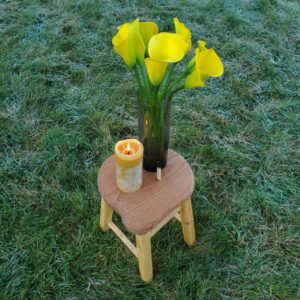It is no coincidence that today, September 29th, 2020, The Denver Waldorf community simultaneously celebrates Michaelmas and our school’s birthday. With some faculty and staff gathering to commemorate the founding of our school 46 years ago, 6th grade teacher Ben Reynolds described the morning:
With frost covering the playfield and the first rays of Autumnal sunshine struggling through the trees with their remaining withering leaves, we surrounded a humble altar early this morning in order to celebrate our past and renew our commitment to the school and our striving to bring the impulse of Waldorf education to our students and our community.
What is Michaelmas?
Our first major festival of the schoolyear, Michaelmas will look and sound differently than any other year. The Festival Hall will sit empty. The children’s voices will not ring out together in song of the dragon slayed. But the call to be courageous feels no less powerful.
What is Michaelmas? Why do we celebrate it? The following article Against Fear: The Michaelmas Call is authored by our Educational Support teacher Nancy Blanning and originally published in Lilipoh in 2016. It sheds light on this fall festival, and invites us to stand in the spirit of Michael: against fear.
We live in a fear-filled world. This has always been true for humanity. Whether it has been threat from wild beasts, natural disasters, famine and starvation, war, plague and illness, or material poverty, humanity has always had big worries. In our own time we experience strongly that fear and anxiety fill the air we breathe every day as well. It is a hard fear-state to deal with because we do not know from where or when a threat may come. This fills us with vague, consistent anxiety. And as parents, we feel fear about our children’s safety and the security of their future. We want to protect them and keep them safe. So we should. We want to defend them, reducing the chance that our children will be physically injured, emotionally wounded, or socially challenged. In reasonable proportion, this is all good. We do not want to submit them to experiences that will overwhelm them. What used to be seen as “making children tough” can now be recognized as insensitivity at best or abuse and neglect when extreme. These we know can irreparably damage children. They can become hardened, inclined toward bullying and aggression, or cower in fearful withdrawal.
Yet a stronger temptation of our current times pulls us in an opposite direction. We want to take no chances with our children’s safety or happiness and become so protective that we effectively wrap them up in “cotton wool.” We can become the classic “helicopter parent” who monitors and controls everything we can. This has its equivalent problems. Living in a controlled environment with reduced challenge does not help to develop skills for living into an uncertain future.
If we look deeply into what is influencing our decisions, we find our own fearfulness. Coming from Old English, the word “fear” originally meant “sudden attack, ambush, or snare.” These are timely images that apply to the mood of our lives now. Our own anxieties magnify our fearfulness about what our children may have to confront. So what are we to do?
So much of current education looks to skill development and technological training as “insurance” toward the future. Yet we see that skills become quickly obsolete with the rapid technological advances streaming—maybe even screaming—towards us. So perhaps a more fundamental question is what are the human capacities we can develop to meet the challenges of an uncertain future? The capacity to respond to the unexpected with flexibility and creativity is one. It is healthy to be surprised, even momentarily stunned by a surprise. But we do not become paralyzed in fear. The capacity to take reasonable, healthy risk is another. This means stepping toward a new, unfamiliar experience, even if feeling anxious. We can feel nervous but not paralyzed with fear.
How do we give our children opportunity to develop these capacities? A great insight Rudolf Steiner has shared is that children live into who and what we adults are rather than what we say. They absorb our unspoken attitudes and emotions. If we live in fearfulness, this is what our children will experience. They will absorb our reluctance to enter into life, holding ourselves back in protective gestures. This is prudent and healthy at certain times; but with this as a life gesture, one cannot truly and fully live.
The fall festival of Michaelmas is about fear and courage. Archangel Michael fights the dragon. This happens year after year. The dragon is never fully quashed. Michael confronts it again and again, never backing away or giving up. Nothing in the stories say that he is fearless. He confronts fear by looking it squarely in the face and refusing to become paralyzed by it. In subtle ways, over-protectiveness encourages a kind of paralysis. It allows less and less activity and exploration so the gestures of living become more and more narrow. To be responsive to what lies ahead for us in the future, we need to be nimble and adaptable. Living in a cloud of unnamed fearfulness stills and freezes.
If we do not want our children to be narrowed by fear, we must break out of our own fetters. Michaelmas stories of courage are usually told to children. But the challenge is for us adults is to look into our own lives. Where does my fear live within me? How can I look it in the face and find my own boldness to confront that which intimidates me? How can I protect my child but not smother? How can I find my inner certainty in the goodness of life so my child and I can walk forth in the spirit of Michael?
